一、简介
UARTE 是带有 EasyDMA 的通用异步接收器/发送器 UART。提供快速、全双工、异步的串口通信,内置流量控制(CTS,RTS)支持硬件,速率高达 1 Mbps。
以下是 UARTE 的主要功能:
- 全双工操作
- 自动硬件流控制
- 生成9位数据带奇偶校验
- EasyDMA
- 波特率高达 1 Mbps
- 在支持的事务之间返回 IDLE(使用HW流控制时)
- 一个停止位
- 最低有效位(LSB)优先
用于每个 UART 接口的 GPIO 可以从设备上的任何 GPIO 来选择并且独立地为可配置的。这使得能够在器件的引脚和有效地利用电路板空间和信号路有很大的灵活性。
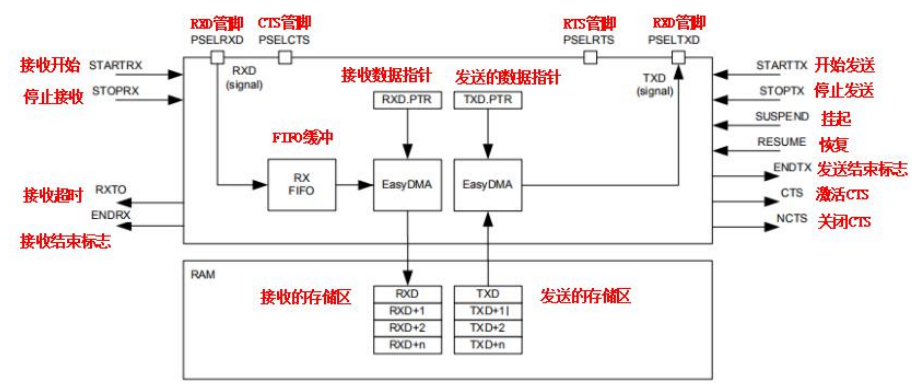
二、硬件连接
| 功能 | 引脚 | 描述 |
|---|---|---|
| UART0_TXD | 6 | 串口0发送端 |
| UART0_RXD | 8 | 串口0接收端 |
| UART1_TXD | 5 | 串口1发送端 |
| UART1_RXD | 7 | 串口1接收端 |
三、修改文件
3.1 app_uart.h
app_uart.h 位于 SDKcomponentslibrariesuart,将原文件备份,将以下内容替换到原文件
/**
* Copyright (c) 2013 - 2020, Nordic Semiconductor ASA
*
* All rights reserved.
*
* Redistribution and use in source and binary forms, with or without modification,
* are permitted provided that the following conditions are met:
*
* 1. Redistributions of source code must retain the above copyright notice, this
* list of conditions and the following disclaimer.
*
* 2. Redistributions in binary form, except as embedded into a Nordic
* Semiconductor ASA integrated circuit in a product or a software update for
* such product, must reproduce the above copyright notice, this list of
* conditions and the following disclaimer in the documentation and/or other
* materials provided with the distribution.
*
* 3. Neither the name of Nordic Semiconductor ASA nor the names of its
* contributors may be used to endorse or promote products derived from this
* software without specific prior written permission.
*
* 4. This software, with or without modification, must only be used with a
* Nordic Semiconductor ASA integrated circuit.
*
* 5. Any software provided in binary form under this license must not be reverse
* engineered, decompiled, modified and/or disassembled.
*
* THIS SOFTWARE IS PROVIDED BY NORDIC SEMICONDUCTOR ASA "AS IS" AND ANY EXPRESS
* OR IMPLIED WARRANTIES, INCLUDING, BUT NOT LIMITED TO, THE IMPLIED WARRANTIES
* OF MERCHANTABILITY, NONINFRINGEMENT, AND FITNESS FOR A PARTICULAR PURPOSE ARE
* DISCLAIMED. IN NO EVENT SHALL NORDIC SEMICONDUCTOR ASA OR CONTRIBUTORS BE
* LIABLE FOR ANY DIRECT, INDIRECT, INCIDENTAL, SPECIAL, EXEMPLARY, OR
* CONSEQUENTIAL DAMAGES (INCLUDING, BUT NOT LIMITED TO, PROCUREMENT OF SUBSTITUTE
* GOODS OR SERVICES; LOSS OF USE, DATA, OR PROFITS; OR BUSINESS INTERRUPTION)
* HOWEVER CAUSED AND ON ANY THEORY OF LIABILITY, WHETHER IN CONTRACT, STRICT
* LIABILITY, OR TORT (INCLUDING NEGLIGENCE OR OTHERWISE) ARISING IN ANY WAY OUT
* OF THE USE OF THIS SOFTWARE, EVEN IF ADVISED OF THE POSSIBILITY OF SUCH DAMAGE.
*
*/
/**@file
*
* @defgroup app_uart UART module
* @{
* @ingroup app_common
*
* @brief UART module interface.
*/
#ifndef APP_UART_H__
#define APP_UART_H__
#include <stdint.h>
#include <stdbool.h>
#include "app_util_platform.h"
#include "nrf_drv_uart.h"
#include "app_fifo.h"
#ifdef __cplusplus
extern "C" {
#endif
#define UART_PIN_DISCONNECTED 0xFFFFFFFF /**< Value indicating that no pin is connected to this UART register. */
/**@brief UART Flow Control modes for the peripheral.
*/
typedef enum
{
APP_UART_FLOW_CONTROL_DISABLED, /**< UART Hw Flow Control is disabled. */
APP_UART_FLOW_CONTROL_ENABLED, /**< Standard UART Hw Flow Control is enabled. */
} app_uart_flow_control_t;
/**@brief UART communication structure holding configuration settings for the peripheral.
*/
typedef struct
{
uint32_t rx_pin_no; /**< RX pin number. */
uint32_t tx_pin_no; /**< TX pin number. */
uint32_t rts_pin_no; /**< RTS pin number, only used if flow control is enabled. */
uint32_t cts_pin_no; /**< CTS pin number, only used if flow control is enabled. */
app_uart_flow_control_t flow_control; /**< Flow control setting, if flow control is used, the system will use low power UART mode, based on CTS signal. */
bool use_parity; /**< Even parity if TRUE, no parity if FALSE. */
uint32_t baud_rate; /**< Baud rate configuration. */
} app_uart_comm_params_t;
/**@brief UART buffer for transmitting/receiving data.
*/
typedef struct
{
uint8_t * rx_buf; /**< Pointer to the RX buffer. */
uint32_t rx_buf_size; /**< Size of the RX buffer. */
uint8_t * tx_buf; /**< Pointer to the TX buffer. */
uint32_t tx_buf_size; /**< Size of the TX buffer. */
} app_uart_buffers_t;
/**@brief Enumeration which defines events used by the UART module upon data reception or error.
*
* @details The event type is used to indicate the type of additional information in the event
* @ref app_uart_evt_t.
*/
typedef enum
{
APP_UART_DATA_READY, /**< An event indicating that UART data has been received. The data is available in the FIFO and can be fetched using @ref app_uart_get. */
APP_UART_FIFO_ERROR, /**< An error in the FIFO module used by the app_uart module has occured. The FIFO error code is stored in app_uart_evt_t.data.error_code field. */
APP_UART_COMMUNICATION_ERROR, /**< An communication error has occured during reception. The error is stored in app_uart_evt_t.data.error_communication field. */
APP_UART_TX_EMPTY, /**< An event indicating that UART has completed transmission of all available data in the TX FIFO. */
APP_UART_DATA, /**< An event indicating that UART data has been received, and data is present in data field. This event is only used when no FIFO is configured. */
} app_uart_evt_type_t;
/**@brief Struct containing events from the UART module.
*
* @details The app_uart_evt_t is used to notify the application of asynchronous events when data
* are received on the UART peripheral or in case an error occured during data reception.
*/
typedef struct
{
app_uart_evt_type_t evt_type; /**< Type of event. */
union
{
uint32_t error_communication; /**< Field used if evt_type is: APP_UART_COMMUNICATION_ERROR. This field contains the value in the ERRORSRC register for the UART peripheral. The UART_ERRORSRC_x defines from nrf5x_bitfields.h can be used to parse the error code. See also the nRFXX Series Reference Manual for specification. */
uint32_t error_code; /**< Field used if evt_type is: NRF_ERROR_x. Additional status/error code if the error event type is APP_UART_FIFO_ERROR. This error code refer to errors defined in nrf_error.h. */
uint8_t value; /**< Field used if evt_type is: NRF_ERROR_x. Additional status/error code if the error event type is APP_UART_FIFO_ERROR. This error code refer to errors defined in nrf_error.h. */
} data;
} app_uart_evt_t;
/**@brief Function for handling app_uart event callback.
*
* @details Upon an event in the app_uart module this callback function will be called to notify
* the application about the event.
*
* @param[in] p_app_uart_event Pointer to UART event.
*/
typedef void (* app_uart_event_handler_t) (app_uart_evt_t * p_app_uart_event);
struct nrf_uart_obj{
nrf_drv_uart_t instance;
bool rx_done;
bool rx_ovf;
app_uart_event_handler_t event_handler;
uint8_t tx_buffer[1];
uint8_t rx_buffer[1];
app_fifo_t rx_fifo; /**< RX FIFO buffer for storing data received on the UART until the application fetches them using app_uart_get(). */
app_fifo_t tx_fifo;/**< TX FIFO buffer for storing data to be transmitted on the UART when TXD is ready. Data is put to the buffer on using app_uart_put(). */
app_uart_comm_params_t const* comm_params;
};
typedef struct nrf_uart_obj nrf_uart_obj_t;
#define APP_UART_DEF(_name, _instance, _buf_size, _event_handler)
static uint8_t _name##_rx_buf[_buf_size];
static uint8_t _name##_tx_buf[_buf_size];
static app_uart_buffers_t _name##_buffers = {
.rx_buf = _name##_rx_buf,
.rx_buf_size = sizeof (_name##_rx_buf),
.tx_buf = _name##_tx_buf,
.tx_buf_size = sizeof (_name##_tx_buf),
};
nrf_uart_obj_t _name = {
.instance = NRF_DRV_UART_INSTANCE(_instance),
.rx_done = false,
.rx_ovf = false,
.event_handler = _event_handler,
}
/**@brief Macro for safe initialization of the UART module in a single user instance when using
* a FIFO together with UART.
*
* @param[in] P_COMM_PARAMS Pointer to a UART communication structure: app_uart_comm_params_t
* @param[in] RX_BUF_SIZE Size of desired RX buffer, must be a power of 2 or ZERO (No FIFO).
* @param[in] TX_BUF_SIZE Size of desired TX buffer, must be a power of 2 or ZERO (No FIFO).
* @param[in] EVT_HANDLER Event handler function to be called when an event occurs in the
* UART module.
* @param[in] IRQ_PRIO IRQ priority, app_irq_priority_t, for the UART module irq handler.
* @param[out] ERR_CODE The return value of the UART initialization function will be
* written to this parameter.
*
* @note Since this macro allocates a buffer and registers the module as a GPIOTE user when flow
* control is enabled, it must only be called once.
*/
#define APP_UART_FIFO_INIT(P_COMM_PARAMS, RX_BUF_SIZE, TX_BUF_SIZE, EVT_HANDLER, IRQ_PRIO, ERR_CODE)
do
{
app_uart_buffers_t buffers;
static uint8_t rx_buf[RX_BUF_SIZE];
static uint8_t tx_buf[TX_BUF_SIZE];
buffers.rx_buf = rx_buf;
buffers.rx_buf_size = sizeof (rx_buf);
buffers.tx_buf = tx_buf;
buffers.tx_buf_size = sizeof (tx_buf);
ERR_CODE = app_uart_init(P_COMM_PARAMS, &buffers, EVT_HANDLER, IRQ_PRIO);
} while (0)
/**@brief Macro for safe initialization of the UART module in a single user instance.
*
* @param[in] P_COMM_PARAMS Pointer to a UART communication structure: app_uart_comm_params_t
* @param[in] EVT_HANDLER Event handler function to be called when an event occurs in the
* UART module.
* @param[in] IRQ_PRIO IRQ priority, app_irq_priority_t, for the UART module irq handler.
* @param[out] ERR_CODE The return value of the UART initialization function will be
* written to this parameter.
*
* @note Since this macro allocates registers the module as a GPIOTE user when flow control is
* enabled, it must only be called once.
*/
#define APP_UART_INIT(P_COMM_PARAMS, EVT_HANDLER, IRQ_PRIO, ERR_CODE)
do
{
ERR_CODE = app_uart_init(P_COMM_PARAMS, NULL, EVT_HANDLER, IRQ_PRIO);
} while (0)
/**@brief Function for initializing the UART module. Use this initialization when several instances of the UART
* module are needed.
*
*
* @note Normally single initialization should be done using the APP_UART_INIT() or
* APP_UART_INIT_FIFO() macro depending on whether the FIFO should be used by the UART, as
* that will allocate the buffers needed by the UART module (including aligning the buffer
* correctly).
* @param[in] p_comm_params Pin and communication parameters.
* @param[in] p_buffers RX and TX buffers, NULL is FIFO is not used.
* @param[in] error_handler Function to be called in case of an error.
* @param[in] irq_priority Interrupt priority level.
*
* @retval NRF_SUCCESS If successful initialization.
* @retval NRF_ERROR_INVALID_LENGTH If a provided buffer is not a power of two.
* @retval NRF_ERROR_NULL If one of the provided buffers is a NULL pointer.
*
* The below errors are propagated by the UART module to the caller upon registration when Hardware
* Flow Control is enabled. When Hardware Flow Control is not used, these errors cannot occur.
* @retval NRF_ERROR_INVALID_STATE The GPIOTE module is not in a valid state when registering
* the UART module as a user.
* @retval NRF_ERROR_INVALID_PARAM The UART module provides an invalid callback function when
* registering the UART module as a user.
* Or the value pointed to by *p_uart_uid is not a valid
* GPIOTE number.
* @retval NRF_ERROR_NO_MEM GPIOTE module has reached the maximum number of users.
*/
uint32_t app_uart_init(nrf_uart_obj_t * uart_obj,
app_uart_buffers_t * p_buffers,
app_irq_priority_t irq_priority);
/**@brief Function for getting a byte from the UART.
*
* @details This function will get the next byte from the RX buffer. If the RX buffer is empty
* an error code will be returned and the app_uart module will generate an event upon
* reception of the first byte which is added to the RX buffer.
*
* @param[out] p_byte Pointer to an address where next byte received on the UART will be copied.
*
* @retval NRF_SUCCESS If a byte has been received and pushed to the pointer provided.
* @retval NRF_ERROR_NOT_FOUND If no byte is available in the RX buffer of the app_uart module.
*/
uint32_t app_uart_get(nrf_uart_obj_t * uart_obj, uint8_t * p_byte);
/**@brief Function for putting a byte on the UART.
*
* @details This call is non-blocking.
*
* @param[in] byte Byte to be transmitted on the UART.
*
* @retval NRF_SUCCESS If the byte was successfully put on the TX buffer for transmission.
* @retval NRF_ERROR_NO_MEM If no more space is available in the TX buffer.
* NRF_ERROR_NO_MEM may occur if flow control is enabled and CTS signal
* is high for a long period and the buffer fills up.
* @retval NRF_ERROR_INTERNAL If UART driver reported error.
*/
uint32_t app_uart_put(nrf_uart_obj_t * uart_obj, uint8_t byte);
/**@brief Function for flushing the RX and TX buffers (Only valid if FIFO is used).
* This function does nothing if FIFO is not used.
*
* @retval NRF_SUCCESS Flushing completed (Current implementation will always succeed).
*/
uint32_t app_uart_flush(nrf_uart_obj_t * uart_obj);
/**@brief Function for closing the UART module.
*
* @retval NRF_SUCCESS If successfully closed.
* @retval NRF_ERROR_INVALID_PARAM If an invalid user id is provided or the user id differs from
* the current active user.
*/
uint32_t app_uart_close(nrf_uart_obj_t * uart_obj);
#ifdef __cplusplus
}
#endif
#endif //APP_UART_H__
/** @} */
3.2 app_uart_fifo.c
app_uart_fifo.c 位于 SDKcomponentslibrariesuart,将原文件备份,将以下内容替换到原文件
/**
* Copyright (c) 2015 - 2020, Nordic Semiconductor ASA
*
* All rights reserved.
*
* Redistribution and use in source and binary forms, with or without modification,
* are permitted provided that the following conditions are met:
*
* 1. Redistributions of source code must retain the above copyright notice, this
* list of conditions and the following disclaimer.
*
* 2. Redistributions in binary form, except as embedded into a Nordic
* Semiconductor ASA integrated circuit in a product or a software update for
* such product, must reproduce the above copyright notice, this list of
* conditions and the following disclaimer in the documentation and/or other
* materials provided with the distribution.
*
* 3. Neither the name of Nordic Semiconductor ASA nor the names of its
* contributors may be used to endorse or promote products derived from this
* software without specific prior written permission.
*
* 4. This software, with or without modification, must only be used with a
* Nordic Semiconductor ASA integrated circuit.
*
* 5. Any software provided in binary form under this license must not be reverse
* engineered, decompiled, modified and/or disassembled.
*
* THIS SOFTWARE IS PROVIDED BY NORDIC SEMICONDUCTOR ASA "AS IS" AND ANY EXPRESS
* OR IMPLIED WARRANTIES, INCLUDING, BUT NOT LIMITED TO, THE IMPLIED WARRANTIES
* OF MERCHANTABILITY, NONINFRINGEMENT, AND FITNESS FOR A PARTICULAR PURPOSE ARE
* DISCLAIMED. IN NO EVENT SHALL NORDIC SEMICONDUCTOR ASA OR CONTRIBUTORS BE
* LIABLE FOR ANY DIRECT, INDIRECT, INCIDENTAL, SPECIAL, EXEMPLARY, OR
* CONSEQUENTIAL DAMAGES (INCLUDING, BUT NOT LIMITED TO, PROCUREMENT OF SUBSTITUTE
* GOODS OR SERVICES; LOSS OF USE, DATA, OR PROFITS; OR BUSINESS INTERRUPTION)
* HOWEVER CAUSED AND ON ANY THEORY OF LIABILITY, WHETHER IN CONTRACT, STRICT
* LIABILITY, OR TORT (INCLUDING NEGLIGENCE OR OTHERWISE) ARISING IN ANY WAY OUT
* OF THE USE OF THIS SOFTWARE, EVEN IF ADVISED OF THE POSSIBILITY OF SUCH DAMAGE.
*
*/
#include "sdk_common.h"
#if NRF_MODULE_ENABLED(APP_UART)
#include "app_uart.h"
#include "nrf_drv_uart.h"
#include "nrf_assert.h"
//static nrf_drv_uart_t app_uart_inst = NRF_DRV_UART_INSTANCE(APP_UART_DRIVER_INSTANCE);
static __INLINE uint32_t fifo_length(app_fifo_t * const fifo)
{
uint32_t tmp = fifo->read_pos;
return fifo->write_pos - tmp;
}
#define FIFO_LENGTH(F) fifo_length(&F) /**< Macro to calculate length of a FIFO. */
//static app_uart_event_handler_t m_event_handler; /**< Event handler function. */
//static uint8_t tx_buffer[1];
//static uint8_t rx_buffer[1];
//static bool m_rx_ovf;
//static app_fifo_t m_rx_fifo; /**< RX FIFO buffer for storing data received on the UART until the application fetches them using app_uart_get(). */
//static app_fifo_t m_tx_fifo; /**< TX FIFO buffer for storing data to be transmitted on the UART when TXD is ready. Data is put to the buffer on using app_uart_put(). */
static void uart_event_handler(nrf_drv_uart_event_t * p_event, void* p_context)
{
app_uart_evt_t app_uart_event;
uint32_t err_code;
nrf_uart_obj_t * uart_obj = (nrf_uart_obj_t *)p_context;
switch (p_event->type)
{
case NRF_DRV_UART_EVT_RX_DONE:
// If 0, then this is a RXTO event with no new bytes.
if(p_event->data.rxtx.bytes == 0)
{
// A new start RX is needed to continue to receive data
(void)nrf_drv_uart_rx(&uart_obj->instance, uart_obj->rx_buffer, 1);
break;
}
// Write received byte to FIFO.
err_code = app_fifo_put(&uart_obj->rx_fifo, p_event->data.rxtx.p_data[0]);
if (err_code != NRF_SUCCESS)
{
app_uart_event.evt_type = APP_UART_FIFO_ERROR;
app_uart_event.data.error_code = err_code;
uart_obj->event_handler(&app_uart_event);
}
// Notify that there are data available.
else if (FIFO_LENGTH(uart_obj->rx_fifo) != 0)
{
app_uart_event.evt_type = APP_UART_DATA_READY;
uart_obj->event_handler(&app_uart_event);
}
// Start new RX if size in buffer.
if (FIFO_LENGTH(uart_obj->rx_fifo) <= uart_obj->rx_fifo.buf_size_mask)
{
(void)nrf_drv_uart_rx(&uart_obj->instance, uart_obj->rx_buffer, 1);
}
else
{
// Overflow in RX FIFO.
uart_obj->rx_ovf = true;
}
break;
case NRF_DRV_UART_EVT_ERROR:
app_uart_event.evt_type = APP_UART_COMMUNICATION_ERROR;
app_uart_event.data.error_communication = p_event->data.error.error_mask;
(void)nrf_drv_uart_rx(&uart_obj->instance, uart_obj->rx_buffer, 1);
uart_obj->event_handler(&app_uart_event);
break;
case NRF_DRV_UART_EVT_TX_DONE:
// Get next byte from FIFO.
if (app_fifo_get(&uart_obj->tx_fifo, uart_obj->tx_buffer) == NRF_SUCCESS)
{
(void)nrf_drv_uart_tx(&uart_obj->instance, uart_obj->tx_buffer, 1);
}
else
{
// Last byte from FIFO transmitted, notify the application.
app_uart_event.evt_type = APP_UART_TX_EMPTY;
uart_obj->event_handler(&app_uart_event);
}
break;
default:
break;
}
}
uint32_t app_uart_init(nrf_uart_obj_t * uart_obj,
app_uart_buffers_t * p_buffers,
app_irq_priority_t irq_priority)
{
uint32_t err_code;
// m_event_handler = event_handler;
if (p_buffers == NULL)
{
return NRF_ERROR_INVALID_PARAM;
}
// Configure buffer RX buffer.
err_code = app_fifo_init(&uart_obj->rx_fifo, p_buffers->rx_buf, p_buffers->rx_buf_size);
VERIFY_SUCCESS(err_code);
// Configure buffer TX buffer.
err_code = app_fifo_init(&uart_obj->tx_fifo, p_buffers->tx_buf, p_buffers->tx_buf_size);
VERIFY_SUCCESS(err_code);
nrf_drv_uart_config_t config = NRF_DRV_UART_DEFAULT_CONFIG;
config.baudrate = (nrf_uart_baudrate_t)uart_obj->comm_params->baud_rate;
config.hwfc = (uart_obj->comm_params->flow_control == APP_UART_FLOW_CONTROL_DISABLED) ?
NRF_UART_HWFC_DISABLED : NRF_UART_HWFC_ENABLED;
config.interrupt_priority = irq_priority;
config.parity = uart_obj->comm_params->use_parity ? NRF_UART_PARITY_INCLUDED : NRF_UART_PARITY_EXCLUDED;
config.pselcts = uart_obj->comm_params->cts_pin_no;
config.pselrts = uart_obj->comm_params->rts_pin_no;
config.pselrxd = uart_obj->comm_params->rx_pin_no;
config.pseltxd = uart_obj->comm_params->tx_pin_no;
config.p_context = uart_obj;
err_code = nrf_drv_uart_init(&uart_obj->instance, &config, uart_event_handler);
VERIFY_SUCCESS(err_code);
uart_obj->rx_ovf = false;
// Turn on receiver if RX pin is connected
if (uart_obj->comm_params->rx_pin_no != UART_PIN_DISCONNECTED)
{
return nrf_drv_uart_rx(&uart_obj->instance, uart_obj->rx_buffer,1);
}
else
{
return NRF_SUCCESS;
}
}
uint32_t app_uart_flush(nrf_uart_obj_t * uart_obj)
{
uint32_t err_code;
err_code = app_fifo_flush(&uart_obj->rx_fifo);
VERIFY_SUCCESS(err_code);
err_code = app_fifo_flush(&uart_obj->tx_fifo);
VERIFY_SUCCESS(err_code);
return NRF_SUCCESS;
}
uint32_t app_uart_get(nrf_uart_obj_t * uart_obj, uint8_t * p_byte)
{
ASSERT(p_byte);
bool rx_ovf = uart_obj->rx_ovf;
ret_code_t err_code = app_fifo_get(&uart_obj->rx_fifo, p_byte);
// If FIFO was full new request to receive one byte was not scheduled. Must be done here.
if (rx_ovf)
{
uart_obj->rx_ovf = false;
uint32_t uart_err_code = nrf_drv_uart_rx(&uart_obj->instance, uart_obj->rx_buffer, 1);
// RX resume should never fail.
APP_ERROR_CHECK(uart_err_code);
}
return err_code;
}
uint32_t app_uart_put(nrf_uart_obj_t * uart_obj, uint8_t byte)
{
uint32_t err_code;
err_code = app_fifo_put(&uart_obj->tx_fifo, byte);
if (err_code == NRF_SUCCESS)
{
// The new byte has been added to FIFO. It will be picked up from there
// (in 'uart_event_handler') when all preceding bytes are transmitted.
// But if UART is not transmitting anything at the moment, we must start
// a new transmission here.
if (!nrf_drv_uart_tx_in_progress(&uart_obj->instance))
{
// This operation should be almost always successful, since we've
// just added a byte to FIFO, but if some bigger delay occurred
// (some heavy interrupt handler routine has been executed) since
// that time, FIFO might be empty already.
if (app_fifo_get(&uart_obj->tx_fifo, uart_obj->tx_buffer) == NRF_SUCCESS)
{
err_code = nrf_drv_uart_tx(&uart_obj->instance, uart_obj->tx_buffer, 1);
}
}
}
return err_code;
}
uint32_t app_uart_close(nrf_uart_obj_t * uart_obj)
{
nrf_drv_uart_uninit(&uart_obj->instance);
return NRF_SUCCESS;
}
#endif //NRF_MODULE_ENABLED(APP_UART)
3.3 retarget.c
retarget.c 位于 SDKcomponentslibrariesuart,将原文件备份,将以下内容替换到原文件
/**
* Copyright (c) 2014 - 2020, Nordic Semiconductor ASA
*
* All rights reserved.
*
* Redistribution and use in source and binary forms, with or without modification,
* are permitted provided that the following conditions are met:
*
* 1. Redistributions of source code must retain the above copyright notice, this
* list of conditions and the following disclaimer.
*
* 2. Redistributions in binary form, except as embedded into a Nordic
* Semiconductor ASA integrated circuit in a product or a software update for
* such product, must reproduce the above copyright notice, this list of
* conditions and the following disclaimer in the documentation and/or other
* materials provided with the distribution.
*
* 3. Neither the name of Nordic Semiconductor ASA nor the names of its
* contributors may be used to endorse or promote products derived from this
* software without specific prior written permission.
*
* 4. This software, with or without modification, must only be used with a
* Nordic Semiconductor ASA integrated circuit.
*
* 5. Any software provided in binary form under this license must not be reverse
* engineered, decompiled, modified and/or disassembled.
*
* THIS SOFTWARE IS PROVIDED BY NORDIC SEMICONDUCTOR ASA "AS IS" AND ANY EXPRESS
* OR IMPLIED WARRANTIES, INCLUDING, BUT NOT LIMITED TO, THE IMPLIED WARRANTIES
* OF MERCHANTABILITY, NONINFRINGEMENT, AND FITNESS FOR A PARTICULAR PURPOSE ARE
* DISCLAIMED. IN NO EVENT SHALL NORDIC SEMICONDUCTOR ASA OR CONTRIBUTORS BE
* LIABLE FOR ANY DIRECT, INDIRECT, INCIDENTAL, SPECIAL, EXEMPLARY, OR
* CONSEQUENTIAL DAMAGES (INCLUDING, BUT NOT LIMITED TO, PROCUREMENT OF SUBSTITUTE
* GOODS OR SERVICES; LOSS OF USE, DATA, OR PROFITS; OR BUSINESS INTERRUPTION)
* HOWEVER CAUSED AND ON ANY THEORY OF LIABILITY, WHETHER IN CONTRACT, STRICT
* LIABILITY, OR TORT (INCLUDING NEGLIGENCE OR OTHERWISE) ARISING IN ANY WAY OUT
* OF THE USE OF THIS SOFTWARE, EVEN IF ADVISED OF THE POSSIBILITY OF SUCH DAMAGE.
*
*/
#include "sdk_common.h"
/** @file
*
* @defgroup retarget Retarget layer for stdio functions
* @{
* @ingroup app_common
* @} */
#if NRF_MODULE_ENABLED(RETARGET)
#if !defined(NRF_LOG_USES_RTT) || NRF_LOG_USES_RTT != 1
#if !defined(HAS_SIMPLE_UART_RETARGET)
#include <stdio.h>
#include <stdint.h>
#include "app_uart.h"
#include "nrf_error.h"
#if defined(__CC_ARM)
// This part is taken from MDK-ARM template file and is required here to prevent
// linker from selecting libraries functions that use semihosting and failing
// because of multiple definitions of fgetc() and fputc().
// Refer to: http://www.keil.com/support/man/docs/gsac/gsac_retargetcortex.htm
// -- BEGIN --
struct __FILE { int handle; /* Add whatever you need here */ };
FILE __stdout;
FILE __stdin;
// --- END ---
extern uint32_t _app_uart_get(uint8_t * p_byte);
extern uint32_t _app_uart_put(uint8_t byte);
int fgetc(FILE * p_file)
{
uint8_t input;
while (_app_uart_get(&input) == NRF_ERROR_NOT_FOUND)
{
// No implementation needed.
}
return input;
}
int fputc(int ch, FILE * p_file)
{
UNUSED_PARAMETER(p_file);
UNUSED_VARIABLE(_app_uart_put((uint8_t)ch));
return ch;
}
#elif defined(__GNUC__) && defined(__SES_ARM)
int __getchar(FILE * p_file)
{
uint8_t input;
while (app_uart_get(&input) == NRF_ERROR_NOT_FOUND)
{
// No implementation needed.
}
return input;
}
#if defined(__SES_VERSION) && (__SES_VERSION >= 34000)
int __putchar(int ch, __printf_tag_ptr tag_ptr)
{
UNUSED_PARAMETER(tag_ptr);
UNUSED_VARIABLE(app_uart_put((uint8_t)ch));
return ch;
}
#else
int __putchar(int ch, FILE * p_file)
{
UNUSED_PARAMETER(p_file);
UNUSED_VARIABLE(app_uart_put((uint8_t)ch));
return ch;
}
#endif
#elif defined(__GNUC__) && !defined(__SES_ARM)
int _write(int file, const char * p_char, int len)
{
int i;
UNUSED_PARAMETER(file);
for (i = 0; i < len; i++)
{
UNUSED_VARIABLE(app_uart_put(*p_char++));
}
return len;
}
int _read(int file, char * p_char, int len)
{
UNUSED_PARAMETER(file);
while (app_uart_get((uint8_t *)p_char) == NRF_ERROR_NOT_FOUND)
{
// No implementation needed.
}
return 1;
}
#elif defined(__ICCARM__)
size_t __write(int handle, const unsigned char * buffer, size_t size)
{
int i;
UNUSED_PARAMETER(handle);
for (i = 0; i < size; i++)
{
UNUSED_VARIABLE(app_uart_put(*buffer++));
}
return size;
}
size_t __read(int handle, unsigned char * buffer, size_t size)
{
UNUSED_PARAMETER(handle);
UNUSED_PARAMETER(size);
while (app_uart_get((uint8_t *)buffer) == NRF_ERROR_NOT_FOUND)
{
// No implementation needed.
}
return 1;
}
long __lseek(int handle, long offset, int whence)
{
return -1;
}
int __close(int handle)
{
return 0;
}
int remove(const char * filename)
{
return 0;
}
#endif
#endif // !defined(HAS_SIMPLE_UART_RETARGET)
#endif // NRF_LOG_USES_RTT != 1
#endif //NRF_MODULE_ENABLED(RETARGET)
四、移植文件
链接:https://pan.baidu.com/s/1eyT7_gK1MBkvk9PNVT_u3g 提取码:h664
将 board_uart.c 和 board_uart.h 两个文件加入工程的Application文件夹下
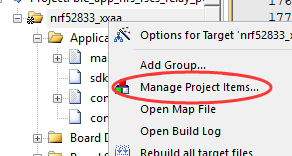
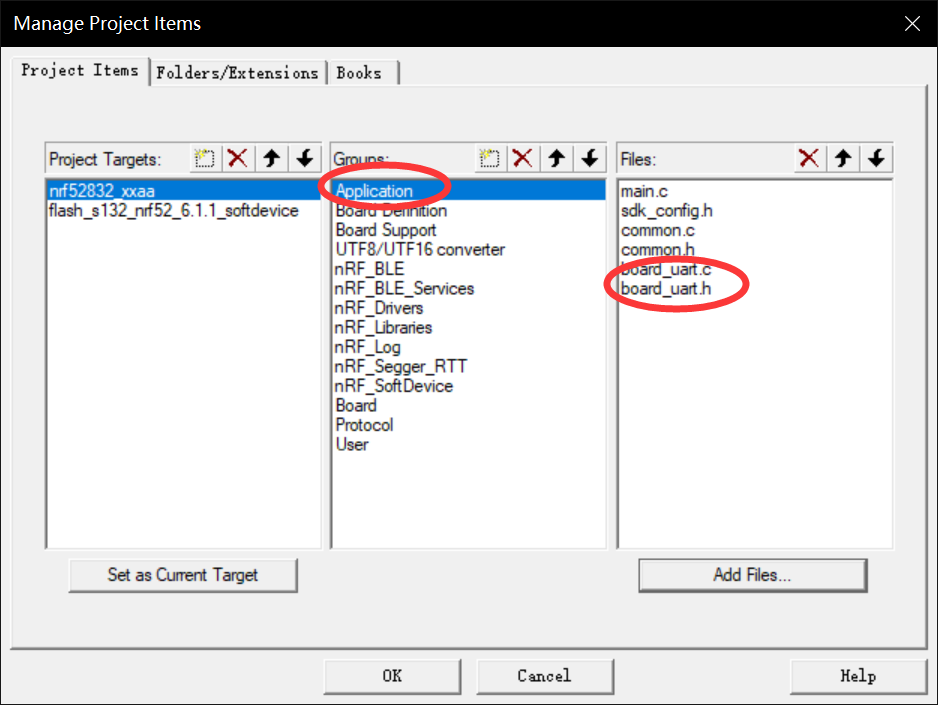
4.1 board_uart.c
/*********************************************************************
* INCLUDES
*/
#include "nrf_uart.h"
#include "app_uart.h"
#include "nrf_log.h"
#include "board_uart.h"
static void uart0_handleEvent(app_uart_evt_t *pEvent);
static void uart1_handleEvent(app_uart_evt_t *pEvent);
/*********************************************************************
* GLOBAL VARIABLES
*/
/*********************************************************************
* LOCAL VARIABLES
*/
APP_UART_DEF(uart0, 0, UART_RX_BUF_SIZE, uart0_handleEvent);
APP_UART_DEF(uart1, 1, UART_RX_BUF_SIZE, uart1_handleEvent);
static uint8_t s_uart0ReadDataBuffer[UART_RX_BUF_SIZE] = {0};
static uint8_t s_index = 0;
static bool s_begin = false;
static uint8_t s_uart1ReadDataBuffer[UART_RX_BUF_SIZE] = {0};
static uint8_t s_index2 = 0;
static bool s_begin2 = false;
/*********************************************************************
* PUBLIC FUNCTIONS
*/
/**
@brief 串口驱动初始化
@param 无
@return 无
*/
void UART_Init(void)
{
uint32_t errCode;
/*------------------------ UART0 ------------------------*/
app_uart_comm_params_t const commParams_0 =
{
.rx_pin_no = BOARD_UART0_RX_IO,
.tx_pin_no = BOARD_UART0_TX_IO,
.rts_pin_no = NRF_UART_PSEL_DISCONNECTED,
.cts_pin_no = NRF_UART_PSEL_DISCONNECTED,
.flow_control = APP_UART_FLOW_CONTROL_DISABLED, // 关掉流控
.use_parity = false,
#if defined (UART_PRESENT)
.baud_rate = NRF_UART_BAUDRATE_115200 // 波特率
#else
.baud_rate = NRF_UARTE_BAUDRATE_115200
#endif
};
uart0.comm_params = &commParams_0;
errCode = app_uart_init(&uart0, &uart0_buffers, APP_IRQ_PRIORITY_LOWEST);
APP_ERROR_CHECK(errCode);
/*------------------------ UART1 ------------------------*/
app_uart_comm_params_t const commParams_1 =
{
.rx_pin_no = BOARD_UART1_RX_IO,
.tx_pin_no = BOARD_UART1_TX_IO,
.rts_pin_no = NRF_UART_PSEL_DISCONNECTED,
.cts_pin_no = NRF_UART_PSEL_DISCONNECTED,
.flow_control = APP_UART_FLOW_CONTROL_DISABLED, // 关掉流控
.use_parity = false,
#if defined (UART_PRESENT)
.baud_rate = NRF_UART_BAUDRATE_115200 // 波特率
#else
.baud_rate = NRF_UART_BAUDRATE_115200
#endif
};
uart1.comm_params = &commParams_1;
errCode = app_uart_init(&uart1, &uart1_buffers, APP_IRQ_PRIORITY_LOWEST);
APP_ERROR_CHECK(errCode);
}
/**
@brief 串口写数据函数
@param uartNum -[in] 串口号
@param pData -[in] 写入数据
@param dataLen -[in] 写入数据长度
@return 无
*/
void UART_WriteData(uint8_t uartNum, uint8_t *pData, uint8_t dataLen)
{
uint8_t i;
if(uartNum == 0)
{
for(i = 0; i < dataLen; i++)
{
app_uart_put(&uart0, pData[i]);
}
}
else if(uartNum == 1)
{
for(i = 0; i < dataLen; i++)
{
app_uart_put(&uart0, pData[i]);
}
}
}
uint32_t _app_uart_get(uint8_t * p_byte)
{
return app_uart_get(&uart1, p_byte);
}
uint32_t _app_uart_put(uint8_t byte)
{
return app_uart_put(&uart1, byte);
}
/*********************************************************************
* LOCAL FUNCTIONS
*/
/**
@brief 串口0读取数据处理函数
@param pEvent -[in] 串口事件
@return 无
*/
static void uart0_handleEvent(app_uart_evt_t *pEvent)
{
uint8_t dataChar = 0;
switch(pEvent->evt_type)
{
// 已接收到UART数据
case APP_UART_DATA_READY:
{
UNUSED_VARIABLE(app_uart_get(&uart0, &dataChar));
// 不是回车符或换行符则开始
if(dataChar != 'n' && dataChar != 'r')
{
s_begin = true;
}
if(s_begin)
{
s_uart0ReadDataBuffer[s_index] = dataChar;
s_index++;
}
// 遇到回车符或换行符结束
if((s_uart0ReadDataBuffer[s_index - 1] == 'n') ||
(s_uart0ReadDataBuffer[s_index - 1] == 'r') ||
(s_index >= MAX_RECV_BUF_SIZE))
{
NRF_LOG_HEXDUMP_INFO(s_uart0ReadDataBuffer, s_index);
memset(s_uart0ReadDataBuffer, 0, s_index);
s_index = 0;
s_begin = false;
}
} break;
// 接收过程中发生通信错误
case APP_UART_COMMUNICATION_ERROR:
// APP_ERROR_HANDLER(pEvent->data.error_communication);
break;
// app_uart模块使用的FIFO模块中出现错误
case APP_UART_FIFO_ERROR:
// APP_ERROR_HANDLER(pEvent->data.error_code);
break;
default:
break;
}
}
/**
@brief 串口1读取数据处理函数
@param pEvent -[in] 串口事件
@return 无
*/
static void uart1_handleEvent(app_uart_evt_t *pEvent)
{
uint8_t dataChar = 0;
switch(pEvent->evt_type)
{
// 已接收到UART数据
case APP_UART_DATA_READY:
{
UNUSED_VARIABLE(app_uart_get(&uart1, &dataChar));
// 不是回车符或换行符则开始
if(dataChar != 'n' && dataChar != 'r')
{
s_begin2 = true;
}
if(s_begin2)
{
s_uart1ReadDataBuffer[s_index2] = dataChar;
s_index2++;
}
// 遇到回车符或换行符结束
if((s_uart1ReadDataBuffer[s_index2 - 1] == 'n') ||
(s_uart1ReadDataBuffer[s_index2 - 1] == 'r') ||
(s_index2 >= MAX_RECV_BUF_SIZE))
{
NRF_LOG_HEXDUMP_INFO(s_uart1ReadDataBuffer, s_index2);
memset(s_uart1ReadDataBuffer, 0, s_index2);
s_index2 = 0;
s_begin2 = false;
}
} break;
// 接收过程中发生通信错误
case APP_UART_COMMUNICATION_ERROR:
// APP_ERROR_HANDLER(pEvent->data.error_communication);
break;
// app_uart模块使用的FIFO模块中出现错误
case APP_UART_FIFO_ERROR:
// APP_ERROR_HANDLER(pEvent->data.error_code);
break;
default:
break;
}
}
/****************************************************END OF FILE****************************************************/
4.2 board_uart.h
#ifndef _BOARD_UART_H_
#define _BOARD_UART_H_
/*********************************************************************
* INCLUDES
*/
#include "nrf_gpio.h"
/*********************************************************************
* DEFINITIONS
*/
#define UART_TX_BUF_SIZE 256 // UART TX buffer size
#define UART_RX_BUF_SIZE 256 // UART RX buffer size
// UART0
#define BOARD_UART0_TX_IO 6 // 发送引脚
#define BOARD_UART0_RX_IO 8 // 接收引脚
// UART1
#define BOARD_UART1_TX_IO 5 // 发送引脚
#define BOARD_UART1_RX_IO 7 // 接收引脚
#define UART0 0
#define UART1 1
/*********************************************************************
* GLOBAL VARIABLES
*/
/*********************************************************************
* API FUNCTIONS
*/
void UART_Init(void);
void UART_WriteData(uint8_t uartNum, uint8_t *pData, uint8_t dataLen);
#endif /* _BOARD_UART_H_ */
五、API调用
需包含头文件 board_uart.h
UART_Init
| 功能 | 初始化UART驱动 |
|---|---|
| 函数定义 | void UART_Init(void) |
| 参数 | 无 |
| 返回 | 无 |
UART_WriteData
| 功能 | 串口写数据函数 |
|---|---|
| 函数定义 | void UART_WriteData(uint8_t uartNum, uint8 *pData, uint8 dataLen) |
| 参数 | uartNum:串口号 pData:写入数据 pdataLen:写入数据长度 |
| 返回 | 无 |
六、SDK配置
点击 sdk_config.h 文件

选择 Configuration Wizard
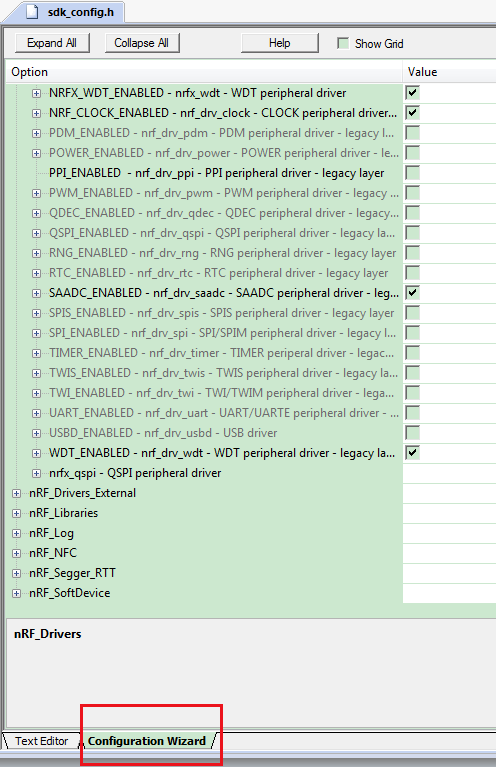
nRF_Drivers 中勾选UART、UARTE、FIFO、STRERROR和RETARGET相关选项
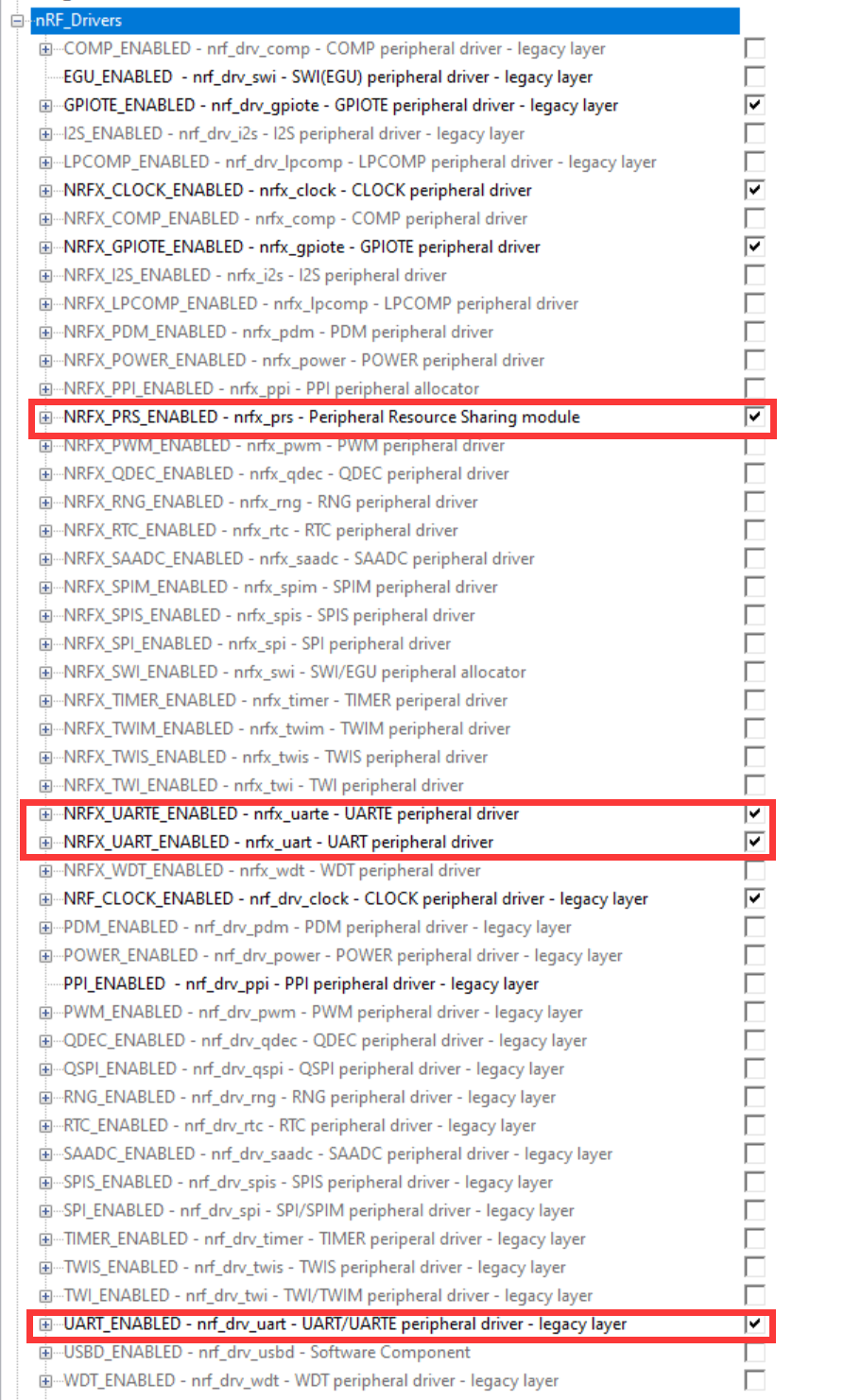
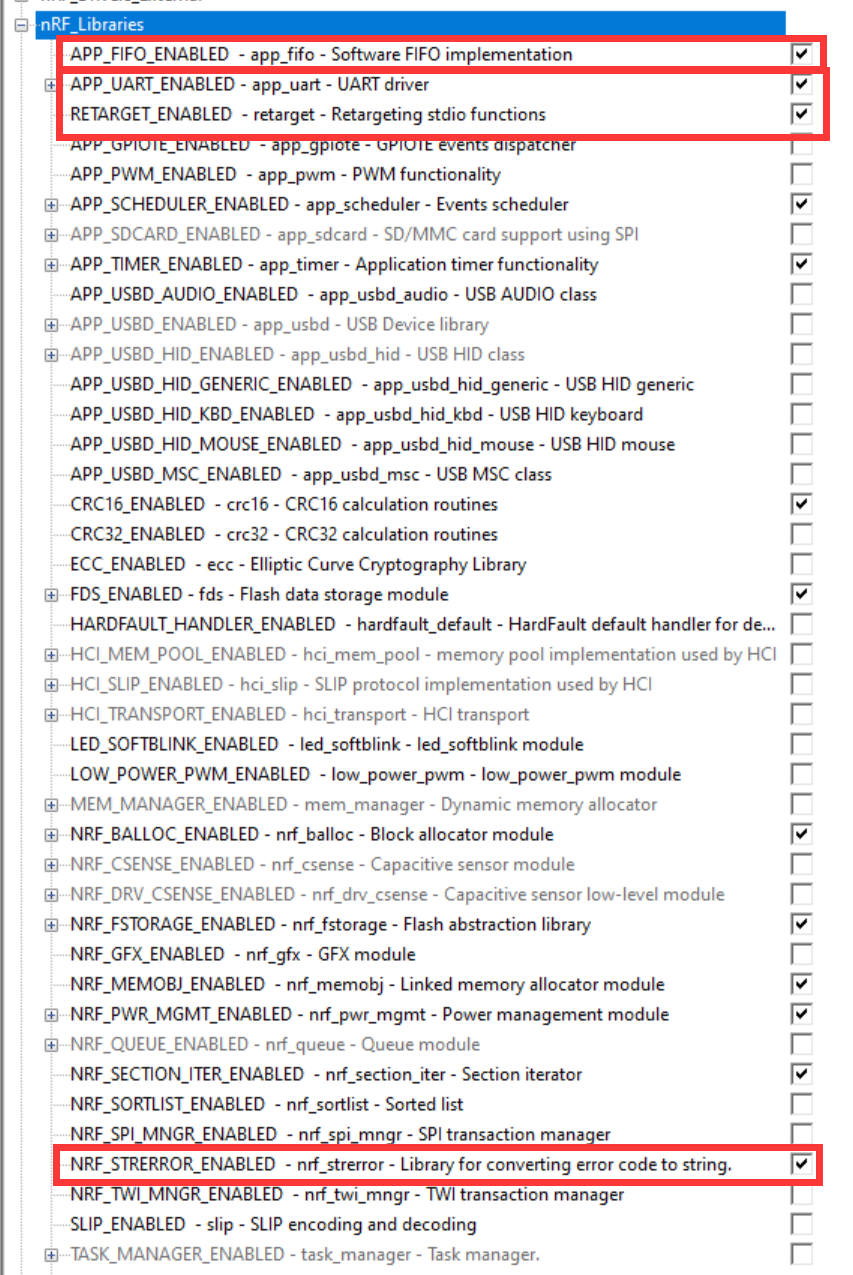
有的工程 nRF_Libraries 没有 APP_FIFO_ENABLED、APP_UART_ENABLED、RETARGET_ENABLED,则在 sdk_config.h 6044行后加上
//==========================================================
// <q> APP_FIFO_ENABLED - app_fifo - Software FIFO implementation
#ifndef APP_FIFO_ENABLED
#define APP_FIFO_ENABLED 1
#endif
// <e> APP_UART_ENABLED - app_uart - UART driver
//==========================================================
#ifndef APP_UART_ENABLED
#define APP_UART_ENABLED 1
#endif
// <o> APP_UART_DRIVER_INSTANCE - UART instance used
// <0=> 0
#ifndef APP_UART_DRIVER_INSTANCE
#define APP_UART_DRIVER_INSTANCE 0
#endif
// </e>
// <q> RETARGET_ENABLED - retarget - Retargeting stdio functions
#ifndef RETARGET_ENABLED
#define RETARGET_ENABLED 1
#endif
在 nRF_Drivers UART_ENABLED 上加上 UART1 使能
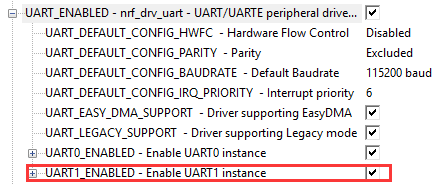
// <e> UART1_ENABLED - Enable UART1 instance
//==========================================================
#ifndef UART1_ENABLED
#define UART1_ENABLED 1
#endif
// <q> UART0_CONFIG_USE_EASY_DMA - Default setting for using EasyDMA
#ifndef UART1_CONFIG_USE_EASY_DMA
#define UART1_CONFIG_USE_EASY_DMA 1
#endif
// </e>
七、添加组件库
在 nRF_Drivers 文件夹和 nRF_Libraries 文件夹确认以下组件库是否存在,不存在则添加。
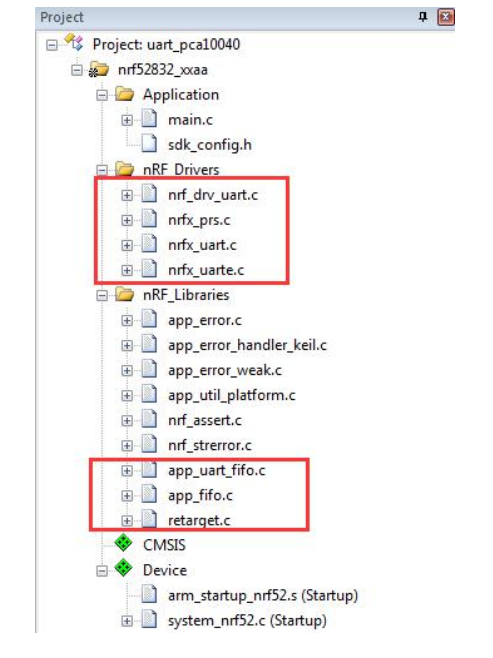
在主从一体的工程中后三个文件没有,需要添加:
- 添加 app_uart_fifo.c 和 retarget.c
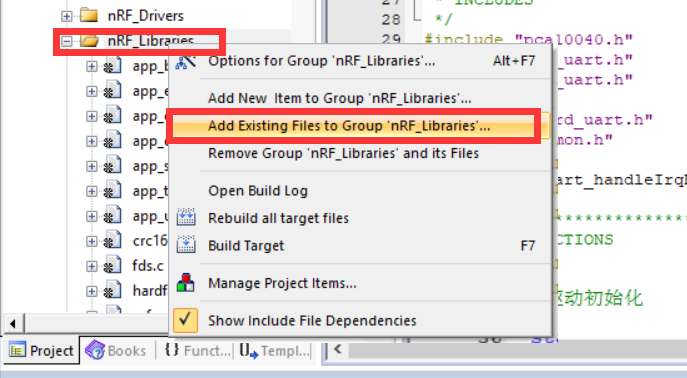
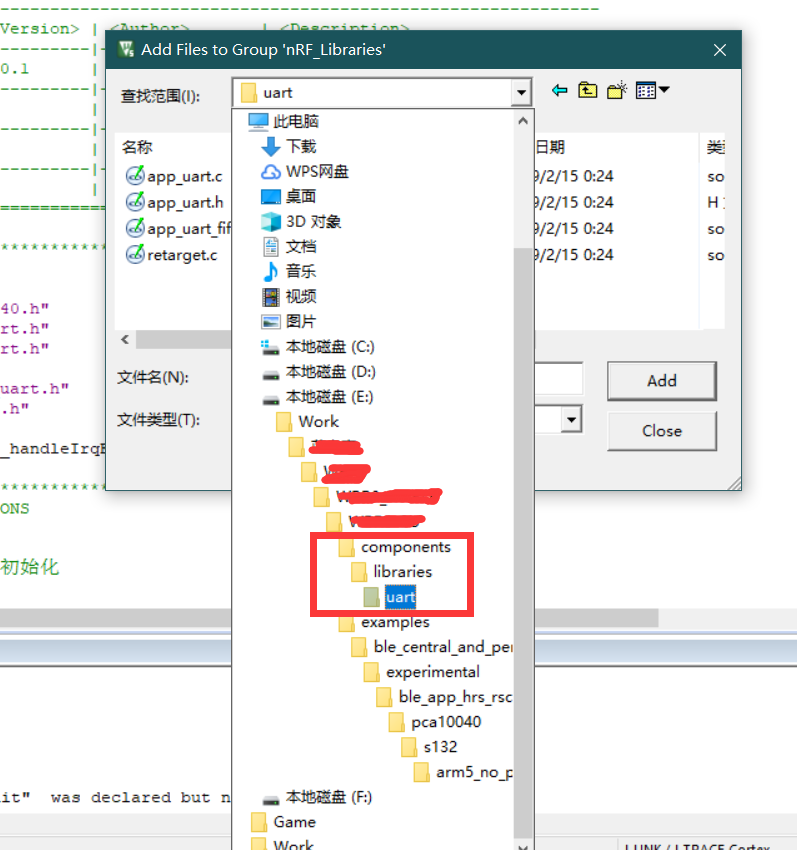
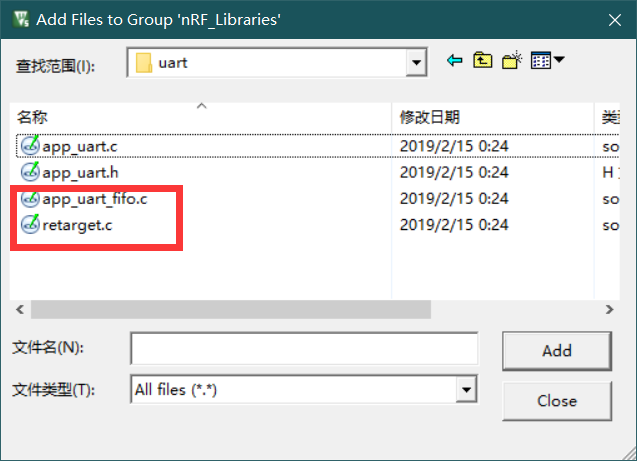
- 添加 app_fifo.c
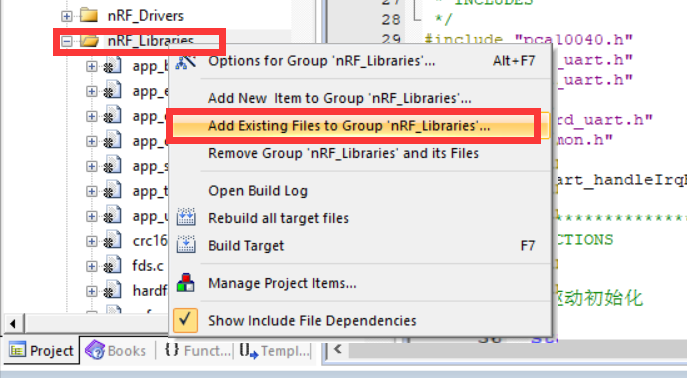
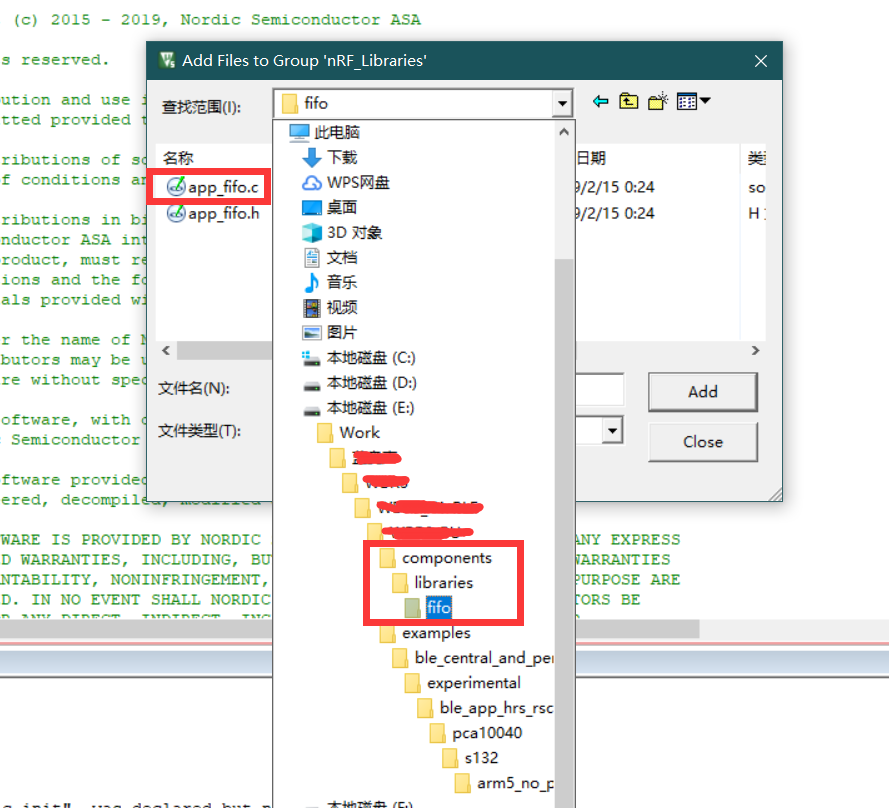
- 添加上述编译文件路径
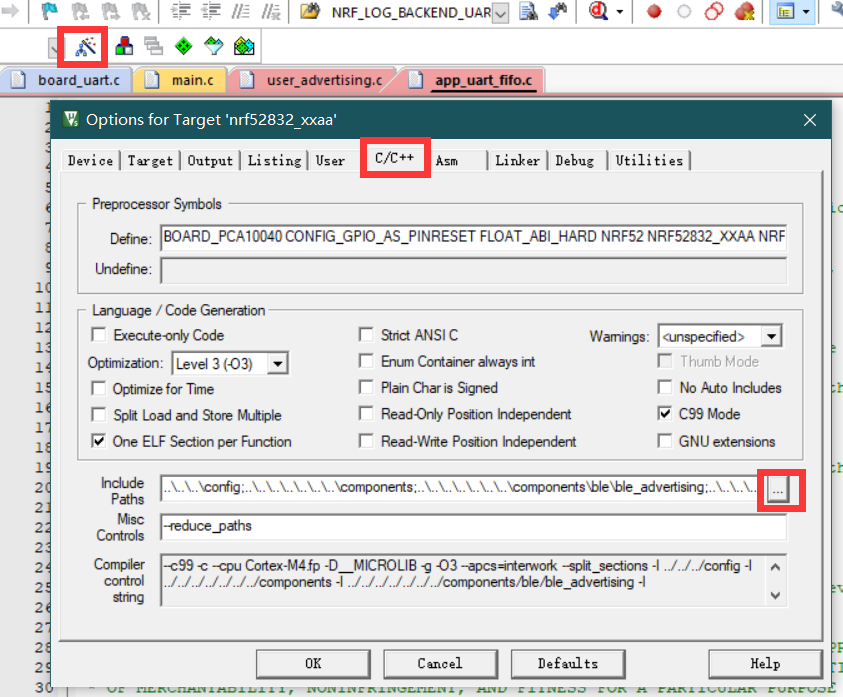
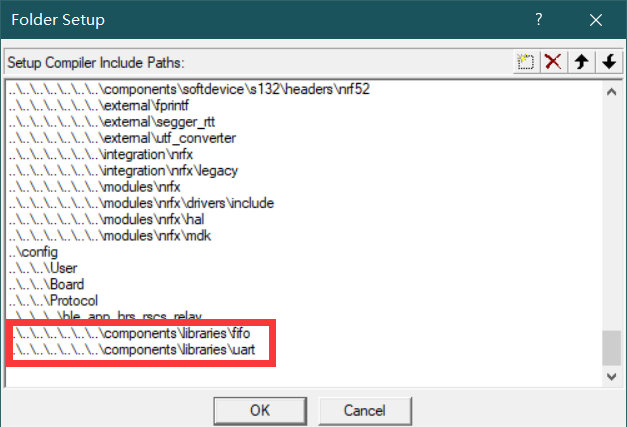
八、使用例子
1)添加头文件
#include "board_uart.h"
2)添加初始化代码
加入 UART_Init()
int main(void)
{
bool erase_bonds;
/*-------------------------- 外设驱动初始化 ---------------------------*/
// Initialize.
log_init(); // 日志驱动初始化
timers_init(); // 定时器驱动初始化(在此加入自定义定时器)
UART_Init(); // SI522驱动初始化(含SPI)
/*-------------------------- 蓝牙协议栈初始化 ---------------------------*/
power_management_init();
ble_stack_init(); // 协议栈初始化
gap_params_init();
gatt_init();
advertising_init(); // 广播初始化
services_init(); // 服务初始化
conn_params_init(); // 连接参数初始化
peer_manager_init();
/*-------------------------- 开启应用 ---------------------------*/
// Start execution.
NRF_LOG_INFO("Template example started.");
advertising_start(erase_bonds); // 开启广播
application_timers_start(); // 定时器应用开启(在此开启自定义定时器)
// Enter main loop.
for(;;)
{
idle_state_handle();
}
}
3)写入串口数据
uint8_t temp[1] = {0x01};
UART_WriteData(UART0, (uint8 *)&temp, 1);
UART_WriteData(UART1, (uint8 *)&temp, 1);
4)接收串口数据
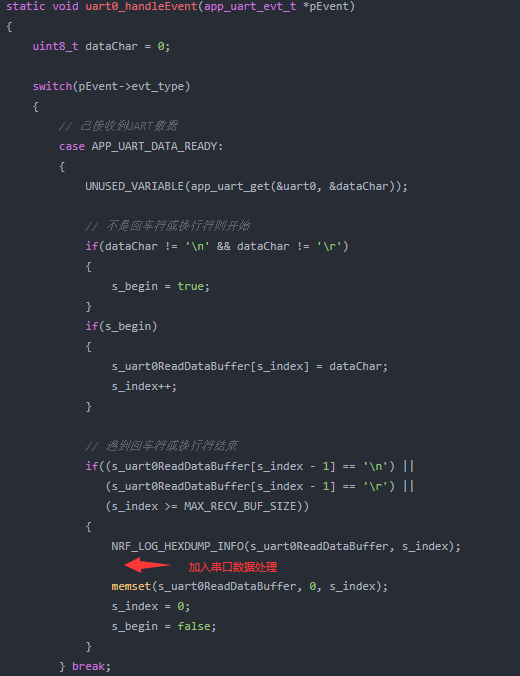
• 由 Leung 写于 2020 年 12 月 17 日
• 参考:nrf52840的uart0与uart1双串口使用
最后
以上就是无语机器猫最近收集整理的关于NRF52833学习笔记(2)——双UART串口使用一、简介二、硬件连接三、修改文件四、移植文件五、API调用六、SDK配置七、添加组件库八、使用例子的全部内容,更多相关NRF52833学习笔记(2)——双UART串口使用一、简介二、硬件连接三、修改文件四、移植文件五、API调用六、SDK配置七、添加组件库八、使用例子内容请搜索靠谱客的其他文章。








发表评论 取消回复